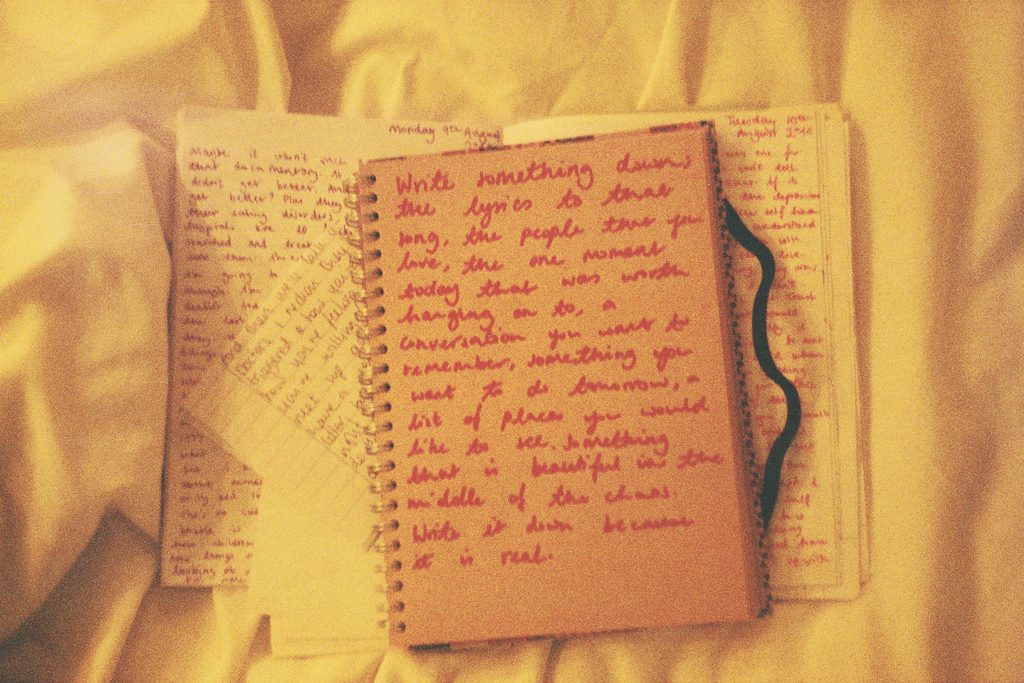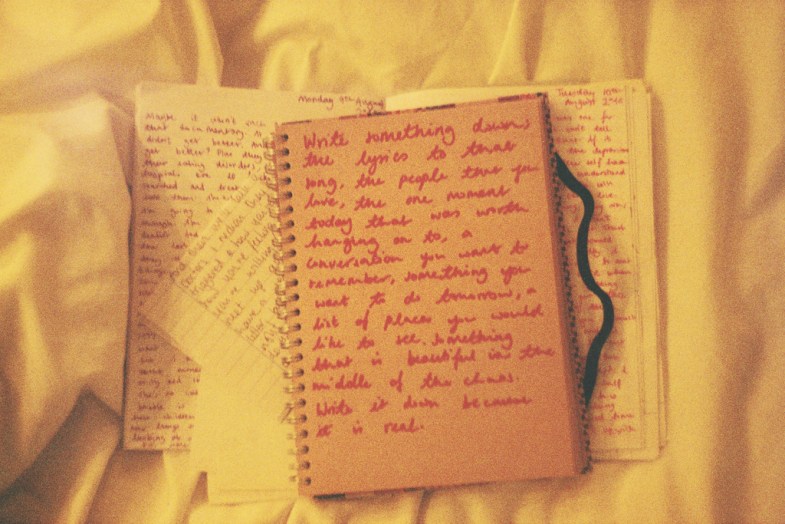
10 Famous Writers And Their Daily Creative Routines
"I write in the morning and then go home about midday and take a shower, because writing, as you know, is very hard work, so you have to do a double ablution. Then I go out and shop — I’m a serious cook — and pretend to be normal."
By ![]() Koty Neelis
Koty Neelis

As a writer I’m always interested in hearing the routines of other creatives. Some firmly believe in waking at dawn and working throughout the morning, while others can only work in the middle of the night. One thing is key: consistency and building a habit of writing every day, regardless of how inspired you feel.
For myself my writing routine varies on the season. In the winter I tend to have the best writing sessions between 9 p.m. and 3 a.m. I use the day to respond to emails, read, publish what I’ve written the night before, listen to music, get ideas, brainstorm, edit slow pieces, but nighttime is my time. It’s when things slow down; the world is calm and quiet. In the spring and summer it’s totally different. The world is much more at peace in the mornings and so I enjoy waking up with the sun, making a pot of coffee and a simple breakfast, driving around or taking walks when everyone is still sleeping, and getting in a chunk of writing before the heat of the day comes.
Here are a collection of the creative habits of some of the most well-known names in writing. Hopefully you’ll find inspiration within their habits for your own writing goals this year.
1. Joan Didion
I need an hour alone before dinner, with a drink, to go over what I’ve done that day. I can’t do it late in the afternoon because I’m too close to it. Also, the drink helps. It removes me from the pages. So I spend this hour taking things out and putting other things in. Then I start the next day by redoing all of what I did the day before, following these evening notes. When I’m really working I don’t like to go out or have anybody to dinner, because then I lose the hour. If I don’t have the hour, and start the next day with just some bad pages and nowhere to go, I’m in low spirits. Another thing I need to do, when I’m near the end of the book, is sleep in the same room with it. That’s one reason I go home to Sacramento to finish things. Somehow the book doesn’t leave you when you’re asleep right next to it. In Sacramento nobody cares if I appear or not. I can just get up and start typing.
2. Kurt Vonnegut
I awake at 5:30, work until 8:00, eat breakfast at home, work until 10:00, walk a few blocks into town, do errands, go to the nearby municipal swimming pool, which I have all to myself, and swim for half an hour, return home at 11:45, read the mail, eat lunch at noon. In the afternoon I do schoolwork, either teach of prepare. When I get home from school at about 5:30, I numb my twanging intellect with several belts of Scotch and water ($5.00/fifth at the State Liquor store, the only liquor store in town. There are loads of bars, though.), cook supper, read and listen to jazz (lots of good music on the radio here), slip off to sleep at ten. I do pushups and sit ups all the time, and feel as though I am getting lean and sinewy, but maybe not.
3. Henry Miller
Work Schedule 1932-1933
MORNINGS:
If groggy, type notes and allocate, as stimulus.
If in fine fettle, write.
AFTERNOONS:
Work of section in hand, following plan of section scrupulously. No intrusions, no diversions. Write to finish one section at a time, for good and all.
EVENINGS:
See friends. Read in cafés.
Explore unfamiliar sections — on foot if wet, on bicycle if dry.
Write, if in mood, but only on Minor program.
Paint if empty or tired.
Make Notes. Make Charts, Plans. Make corrections of MS.
Note: Allow sufficient time during daylight to make an occasional visit to museums or an occasional sketch or an occasional bike ride. Sketch in cafés and trains and streets. Cut the movies! Library for references once a week
4. Haruki Murakami
When I’m in writing mode for a novel, I get up at 4:00 am and work for five to six hours. In the afternoon, I run for 10km or swim for 1500m (or do both), then I read a bit and listen to some music. I go to bed at 9:00 pm. I keep to this routine every day without variation. The repetition itself becomes the important thing; it’s a form of mesmerism. I mesmerize myself to reach a deeper state of mind. But to hold to such repetition for so long — six months to a year — requires a good amount of mental and physical strength. In that sense, writing a long novel is like survival training. Physical strength is as necessary as artistic sensitivity.
5. Stephen King
Like your bedroom, your writing room should be private, a place where you go to dream. Your schedule — in at about the same time every day, out when your thousand words are on paper or disk — exists in order to habituate yourself, to make yourself ready to dream just as you make yourself ready to sleep by going to bed at roughly the same time each night and following the same ritual as you go.
In both writing and sleeping, we learn to be physically still at the same time we are encouraging our minds to unlock from the humdrum rational thinking of our daytime lives. And as your mind and body grow accustomed to a certain amount of sleep each night — six hours, seven, maybe the recommended eight — so can you train your waking mind to sleep creatively and work out the vividly imagined waking dreams which are successful works of fiction.
The space can be humble … and it really needs only one thing: A door you are willing to shut. The closed door is your way of telling the world that you mean business. . . .
6. Maya Angelou
I write in the morning and then go home about midday and take a shower, because writing, as you know, is very hard work, so you have to do a double ablution. Then I go out and shop — I’m a serious cook — and pretend to be normal. I play sane — Good morning! Fine, thank you. And you? And I go home. I prepare dinner for myself and if I have houseguests, I do the candles and the pretty music and all that. Then after all the dishes are moved away I read what I wrote that morning. And more often than not if I’ve done nine pages I may be able to save two and a half or three. That’s the cruelest time you know, to really admit that it doesn’t work. And to blue pencil it. When I finish maybe fifty pages and read them — fifty acceptable pages — it’s not too bad.
7. Karen Russell
I know many writers who try to hit a set word count every day, but for me, time spent inside a fictional world tends to be a better measure of a productive writing day. I think I’m fairly generative as a writer, I can produce a lot of words, but volume is not the best metric for me. It’s more a question of, did I write for four or five hours of focused time, when I did not leave my desk, didn’t find some distraction to take me out of the world of the story? Was I able to stay put and commit to putting words down on the page, without deciding mid-sentence that it’s more important to check my email, or “research” some question online, or clean out the science fair projects in the back for my freezer?
I’ve decided that the trick is just to keep after it for several hours, regardless of your own vacillating assessment of how the writing is going. Showing up and staying present is a good writing day.
I think it’s bad so much of the time. The periods where writing feels effortless and intuitive are, for me, as I keep lamenting, rare. But I think that’s probably the common ratio of joy to despair for most writers, and I definitely think that if you can make peace with the fact that you will likely have to throw out 90 percent of your first draft, then you can relax and even almost enjoy “writing badly.”
8. Barbara Kingsolver
I tend to wake up very early. Too early. Four o’clock is standard. My morning begins with trying not to get up before the sun rises. But when I do, it’s because my head is too full of words, and I just need to get to my desk and start dumping them into a file. I always wake with sentences pouring into my head. So getting to my desk every day feels like a long emergency. It’s a funny thing: people often ask how I discipline myself to write. I can’t begin to understand the question. For me, the discipline is turning off the computer and leaving my desk to do something else.
I write a lot of material that I know I’ll throw away. It’s just part of the process. I have to write hundreds of pages before I get to page one.
For the whole of my career as a novelist, I have also been a mother. I was offered my first book contract, for The Bean Trees, the day I came home from the hospital with my first child. So I became a novelist and mother on the same day. Those two important lives have always been one for me. I’ve always had to do both at the same time. So my writing hours were always constrained by the logistics of having my children in someone else’s care. When they were little, that was difficult. I cherished every hour at my desk as a kind of prize. As time has gone by and my children entered school it became progressively easier to be a working mother. My oldest is an adult, and my youngest is 16, so both are now self–sufficient —but that’s been a gradual process. For me, writing time has always been precious, something I wait for and am eager for and make the best use of. That’s probably why I get up so early and have writing time in the quiet dawn hours, when no one needs me.
I used to say that the school bus is my muse. When it pulled out of the driveway and left me without anyone to take care of, that was the moment my writing day began, and it ended when the school bus came back. As a working mother, my working time was constrained. On the other hand, I’m immensely grateful to my family for normalizing my life, for making it a requirement that I end my day at some point and go and make dinner. That’s a healthy thing, to set work aside and make dinner and eat it. It’s healthy to have these people in my life who help me to carry on a civilized routine. And also to have these people in my life who connect me to the wider world and the future. My children have taught me everything about life and about the kind of person I want to be in the world. They anchor me to the future in a concrete way. Being a mother has made me a better writer. It’s also true to say that being a writer has made me a better mother.
9. E.B. White
I never listen to music when I’m working. I haven’t that kind of attentiveness, and I wouldn’t like it at all. On the other hand, I’m able to work fairly well among ordinary distractions. My house has a living room that is at the core of everything that goes on: it is a passageway to the cellar, to the kitchen, to the closet where the phone lives. There’s a lot of traffic. But it’s a bright, cheerful room, and I often use it as a room to write in, despite the carnival that is going on all around me.
In consequence, the members of my household never pay the slightest attention to my being a writing man — they make all the noise and fuss they want to. If I get sick of it, I have places I can go. A writer who waits for ideal conditions under which to work will die without putting a word on paper.
10. Hunter S. Thompson
3:00 p.m. rise
3:05 Chivas Regal with the morning papers, Dunhills
3:45 cocaine
3:50 another glass of Chivas, Dunhill
4:05 first cup of coffee, Dunhill
4:15 cocaine
4:16 orange juice, Dunhill
4:30 cocaine
4:54 cocaine
5:05 cocaine
5:11 coffee, Dunhills
5:30 more ice in the Chivas
5:45 cocaine, etc., etc.
6:00 grass to take the edge off the day
7:05 Woody Creek Tavern for lunch-Heineken, two margaritas, coleslaw, a taco salad, a double order of fried onion rings, carrot cake, ice cream, a bean fritter, Dunhills, another Heineken, cocaine, and for the ride home, a snow cone (a glass of shredded ice over which is poured three or four jiggers of Chivas)
9:00 starts snorting cocaine seriously
10:00 drops acid
11:00 Chartreuse, cocaine, grass
11:30 cocaine, etc, etc.
12:00 midnight, Hunter S. Thompson is ready to write
12:05-6:00 a.m. Chartreuse, cocaine, grass, Chivas, coffee, Heineken, clove cigarettes, grapefruit, Dunhills, orange juice, gin, continuous pornographic movies.
6:00 the hot tub-champagne, Dove Bars, fettuccine Alfredo
8:00 Halcyon
8:20 sleep











